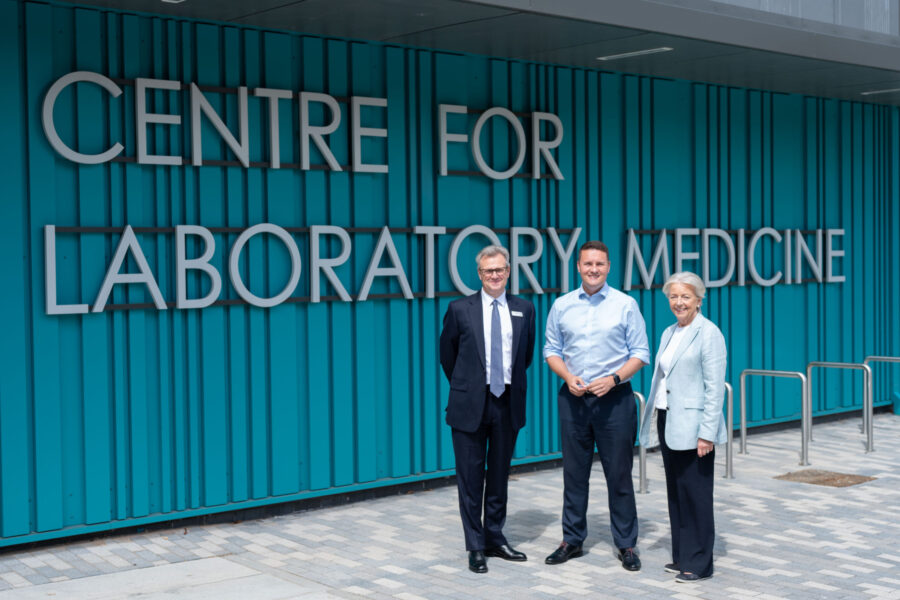
- Health and Social Care Secretary visits Leeds Cancer Centre and lauds use of trailblazing technology
- 3D hologram tech, ultrasound device to treat liver cancer, AI, and MRI simulator are helping to revolutionise treatment in Leeds
- If used on a national scale, such technology could cut cancer waiting times and save the NHS millions of pounds
As part of the battle against cancer, Health and Social Care Secretary Wes Streeting has witnessed firsthand the innovative approach to cancer diagnosis and treatment at St James’ University Hospital in Leeds in hopes of delivering similar initiatives on a national scale.
During a visit to the hospital’s cancer centre, Wes Streeting saw its new MRI Simulator which produces high-definition, high-contrast images of a patient’s organs, so more precise and targeted treatment can be delivered while reducing the risk of side-effects. He also saw how AI can be used to analyse these images to plan treatments more quickly than a doctor alone.
Wes Streeting also received a demonstration of a new device which spots and destroys liver cancer tumours using focused ultrasound waves – without damaging healthy tissue. This offers a safer alternative to radiotherapy.
It could improve quality of life for many patients going through treatment – reducing time spent in hospital, surgical complications, and recovery time. The company behind the device, HistoSonics, hopes to extend the treatment to other organs in the future – working the NIHR HealthTech Research Centre.
The Government is looking to roll out similar technology across the country to help improve cancer diagnosis and treatment. It will provide funding to double the number of CT and MRI scanners in the NHS over a parliament, and streamline procurement while cutting burdensome red tape. This will give innovators a clear route to getting products rolled out across the health service.
Health and Social Care Secretary Wes Streeting said:
“The NHS is broken, but not beaten. This Government will fix it by taking the best of the NHS to the rest of the NHS. We will arm the health service with state-of-the-art equipment and new technology, to bring our analogue NHS into the digital age.
“It was inspiring to see how staff in Leeds are using groundbreaking devices to treat patients quickly and effectively.
“At the end of May, there were over 1.6 million people waiting for key diagnostic tests. We have to diagnose patients earlier, and we will learn from St James’ as we work to support innovators, slash unnecessary red tape, and build a health service fit for the future.”
The Secretary of State also received a demonstration of interactive 3D hologram technology – developed by HoloCare – which aims to reduce the risk of surgical complications for patients and improve their overall outcomes. Using AI enabled headsets, surgeons and their teams can view 3D holograms of a patient’s organs, so they can plan for surgery more efficiently and effectively.
Professor Phil Wood, Chief Executive at Leeds Teaching Hospitals, said:
“We were really pleased to welcome the Secretary of State to St James’s Hospital to see some of the brilliant innovation here in Leeds.
“One of our commitments at Leeds Teaching Hospitals is to strengthen our culture of research and innovation, and we are passionate about harnessing the power of technology to make life better for patients and staff in healthcare.
“Our plans to bring together the public and private sector as part of the Innovation Village gives us the opportunity to develop a world-class hub for our city. We are proud to be working alongside innovators in technology, education and healthcare to pioneer new treatments and care that will be game-changing for the NHS.
“Being able to share this with the Secretary of State is a proud moment for our colleagues and we look forward to continuing this important work.”
The Health and Social Care Secretary spoke to staff at the hospital to ask their ideas for turning the NHS around. He also had the chance to speak to junior doctors, after the Government agreed a new pay deal which could pave the way to the end of strikes.
Finishing the visit, Mr Streeting held a Town Hall event with health leaders from across the region.
Today’s visit was part of a series across regions in England over the coming weeks, with the visit to Leeds focused on the Government’s commitment to delivering innovative medical technology. The Secretary of State is seeking the ideas of staff and patients across the NHS to help shape the Government’s 10-year plan to fix the NHS, due to be published next year.